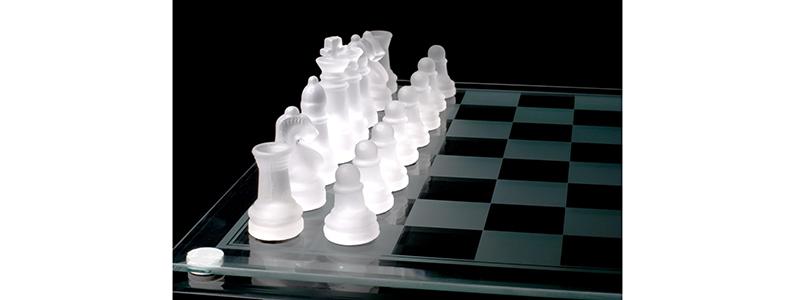
by Doug Goldstein CFP® | Apr 24, 2018 | Chess, Financial Strategies |
Here’s a way that can help you strengthen your investments and improve their performance: double your power. What does this mean? When two chess pieces work together on the board, they can create an impenetrable force. Frequently, chess experts follow this method by lining up two pieces that have a similar pattern of moving in order to deliver a “one-two” punch. Here’s a real-life example of how this works. (If you’re not a chess enthusiast, skip ahead to the next paragraph to learn how to deliver a “one-two” punch with your finances.) In 1992, Susan Polgar played Anatoly Karpov and used a pair of white rooks to confront Karpov’s king. Each rook protected the other, while simultaneously presenting the threat of checkmate. Two moves later, White delivered the final blow, adding the queen’s power to an already strong position. By getting her pieces to work together, and using a “one-two” punch, Susan won the game. To watch a two-minute video showing how Susan Polgar used double power to defeat Anatoly Karpov, click here. Strengthen the power of your investments This principle can also apply to investing. Investors sometimes forgo the important tactic of consolidating their forces. Instead of strengthening their more powerful positions, they invest small sums of money here and there, hoping to find something better than what they have. Even worse, they may sell a strong position in order to free up cash to try an unknown possibility. Boost the power of your investments by finding the more successful ones and adding to them. Pairing up your strong pieces by putting more money into your strong investments... Click for more

by Doug Goldstein CFP® | Nov 7, 2017 | Chess, Decision Making |
Is it always an act of kindness to give your adult children financial support? Many parents who give their grown children financial assistance have good intentions. While their generosity appears to be a gift on the surface, these adult children may pay a heavy price for the free money. Why is supporting your adult children so damaging? When overprotecting your king ruins your game Let’s take a look at what happens if a chess player is too protective of his most vulnerable piece – the king: As the most important piece on the board, the king needs protection. But sometimes building a strong fortification around the king makes it more susceptible to a deadly attack since it cannot move itself out of harm’s way. Too much protection of a valuable piece can actually stifle its movements. Similarly, as a “chess dad,” who has watched winning and losing tournaments, I can tell you how difficult it is not to help my kids. I know that when the pressure is on, it’s important to let them play their own game. By giving them space to move themselves, they learn how to become self-sufficient. This teaches an important financial lesson: Sometimes overprotecting a valuable asset leads to its ultimate downfall. This may happen if you give too much financial support to your children. Consider those folks who hover over every aspect of their children’s lives, buying their sons and daughters anything they want. Their tuition and extracurricular activities, no matter how expensive, get delivered to them, along with credit cards to use without needing to pay the bills. Finally after grad school,... Click for more

by Doug Goldstein CFP® | Jun 6, 2017 | Chess, Strategic Thinking |
Grandmaster Garry Kasparov gave Grandmaster Susan Polgar’s chess team a good tip for dealing with time pressure when he told them, “Always keep ten extra minutes on the clock, or you will end up making rushed decisions.” When you feel pressured by time, it’s easy to make a move that you may later regret. Time pressure can make you feel cornered and desperate, and you may end up moving randomly, feeling accomplished as long as you did something. Take time to make balanced decisions The effects of time pressure are not only felt on the chessboard, but can also be felt in your financial life. For example, pressure to buy/sell a particular investment immediately so you “don’t miss out on a great opportunity” may cause you to act without thinking. Before you make any financial move, you must decide if it is really the best move for you at this time. Tips for minimizing time pressure You can limit time pressure in your financial life by using time more effectively. Save time by paying your bills online or through an automatic payment system. Automate your savings so that you always pay yourself first. This way, you know that it’s done. Organize your time so that you use it productively. Unlike your investments, if you lose time, you can’t make it back. Create a daily calendar, scheduling your tasks to make sure you accomplish the most important things first. When you build your plan, remember to add those ten extra minutes to cover the unexpected things that may cause you to make a rushed decision (remember Kasparov’s advice above?). Efficiency,... Click for more

by Doug Goldstein CFP® | May 9, 2017 | Chess |
Some of the world’s best chess players learned how to play when they were very young. The youngest person so far to become a grandmaster is Sergey Karjakin of Ukraine, who won the title at the age of 12 in 2002. In the same way that your child can become a good chess player if he learns the game at a young age, he can also become good at investing and managing his money if he begins learning basic financial concepts when he is very small. Why? What makes a child a strong chess player? You don’t have to be a genius to learn to play chess. Anyone with enough practice and skills can learn to play a good game of chess. However, a young child can absorb the necessary techniques and skills quicker than someone older, whose habits and mindset are already ingrained. Children may also be more enthusiastic about challenges and winning games than adults, giving them the push to learn more. If you give your child chess instruction at a very young age, what will happen? If he enjoys playing chess and develops his abilities, he may become a chess grandmaster. But even if he doesn’t play in chess tournaments or win any prizes, he will develop strategic thinking skills that will benefit him later on in life, whether in the classroom, at work, or in his personal life. The same idea applies to finance In the same way that a child can pick up chess skills more easily than an older person, it is easier to learn positive financial habits when still young rather than... Click for more

by Doug Goldstein CFP® | Apr 25, 2017 | Chess, Financial Strategies |
When you play chess, you need to take small steps to success rather than making grandiose moves or waiting for your opponent’s blatant blunders. A good chess player builds his defensive and offensive fortress slowly, accumulating small advantages wherever possible. The same idea applies to finance. Since it’s unlikely that you will win enough money in the lottery to support you forever, you’ll need to accrue money in reasonable, steady amounts. Over time, a collection of seemingly trivial sums adds up. The book Rich As A King: How the Wisdom of Chess Can Make You a Grandmaster of Investing suggests the following small steps to help you build your nest egg. (To watch a 3-minute video about this, click here.): Regular savings. Squirrel away $5 per day, and put it into a stock mutual fund monthly or quarterly over twenty years. If you net 6% per year on that pool of money, you’ll end up with over $67,000. (If you can save even more, great!) Lower fees and expenses. Look for ways to reduce small, recurring cash outlays. You could transfer your banking relationship to a lower-priced firm (saving $400 per year), pay off your credit card every month (or better yet, switch to a debit card) and save $2,000 per year in interest payments, and renegotiate your cable and cell phone bills (save $30 per month). Examine your budget to find other possible savings routes. Implementing these alone would allow you to sock away $3,800 every year. Get a better salary or find a second income. Could you find a job with a better salary, or perhaps work... Click for more

by Doug Goldstein CFP® | Mar 28, 2017 | Chess |
Today, more and more schools around the world are teaching children how to play chess. But you don’t have to confine your child’s chess lessons to the classroom. If you want your child to learn to play chess, sign up for a free copy of a Chess Teaching Guide for Teachers and Parents by Grandmaster Susan Polgar. What are the benefits of playing chess? Playing chess can help you improve your analytical thinking skills, confidence, and overall health. Murray Thompson, of Flinders University in Australia, carried out a study on whether playing chess improves scholastic achievements, measured by an increase in IQ levels. He concluded that IQ increased as a result of playing chess due to the concentration and logical thinking that players use when planning and making their moves. Several studies conducted among schoolchildren found that children who learn chess in school develop strong verbal, intellectual, and numerical abilities. For this reason, countries such as Armenia, Norway, and Spain teach chess as a compulsory school subject. Chess in the Schools teaches inner city public school students how to play chess as a means to improve their academic performance and aspire to better lives. (To watch a video of an interview with the chair emeritus of Chess in the Schools, Lewis Cullman, click here.) Another study, published in The New England Journal of Medicine, found that when people 75+ played chess and other intellectually stimulating games, they were less likely to develop dementia than their non-game-playing peers. Chess can also teach financial skills Apart from all of the intellectual benefits that chess provides, you can also apply chess logic... Click for more










